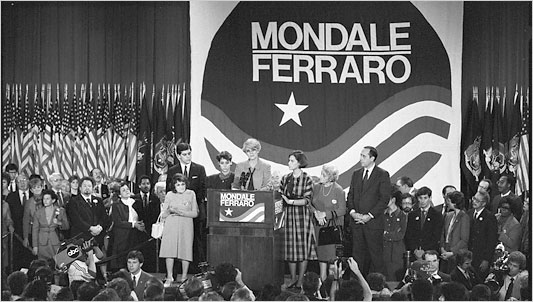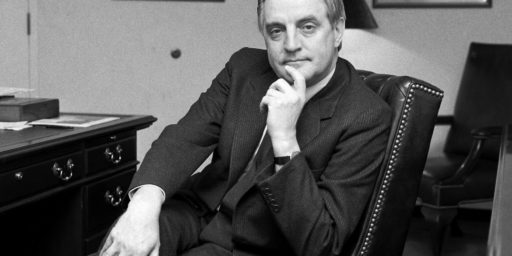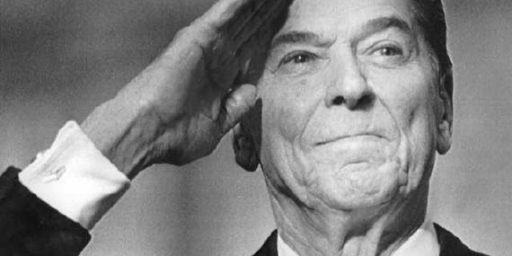Geraldine Ferraro Dies At 75
The first female, and the first Italian-American, to run on a major party Presidential ticket passed away earlier today at the age of 75:
Geraldine A. Ferraro, the former Queens congresswoman who in 1984 strode onto a podium to accept the Democratic nomination for vice president and to take her place in American history as the first woman nominated for national office by a major party, died on Saturday at Massachusetts General Hospital in Boston. She was 75.
The cause was complications from multiple myeloma, a blood cancer that she had battled for 12 years, her family said in a statement.
“If we can do this, we can do anything,” Ms. Ferraro declared on a July evening to a cheering Democratic National Convention in San Francisco. And for a moment, for the Democratic Party and an untold number of American women, anything seemed possible: a woman occupying the second-highest office in the land, a derailing of the Republican juggernaut led by President Ronald Reagan, a President Walter F. Mondale.
It did not turn out that way — not by a long shot. After the roars in the Moscone Center had subsided and a fitful general election campaign had run its course, hopes for Mr. Mondale and his plain-speaking, barrier-breaking running mate were buried in a Reagan landslide. But Ms. Ferraro’s supporters proclaimed a victory of sorts nonetheless: 64 years after women won the right to vote, a woman had removed the “men only” sign from the White House door.
It would be another 24 years before another woman from a major party was nominated for vice president — Gov. Sarah Palin of Alaska, the Republican running mate of Senator John McCain in 2008. And though Hillary Rodham Clinton came close to being nominated that year in her primary run as a senator from New York, a woman has yet to occupy the Oval Office. But Ms. Ferraro’s ascendance gave many women heart.
Ann Richards, who was the Texas state treasurer at the time and went on to become governor of the state, recalled that after the Ferraro nomination, “the first thing I thought of was not winning in the political sense, but of my two daughters.”
“To think,” she added, “of the numbers of young women who can now aspire to anything.”
As Mr. Mondale’s surprise choice, Ms. Ferraro rocketed to national prominence, propelled by fervid feminist support, a spirited and sometimes saucy personality, canny political skills and the calculation by Democratic strategists that Reagan might be vulnerable on issues thought to be more important to women. Instead, the campaign was hounded by a barrage of questions about her family finances and the business dealings of her husband, John A. Zaccaro — often carrying insinuations about ties to organized crime — that not only blemished Ms. Ferraro’s stature as the first Italian-American national candidate but also diverted attention from other issues.A former Queens criminal prosecutor, she was a vigorous but relatively inexperienced candidate with a better feel for urban ward politics than for international diplomacy. But she proved to be a quick study and came across as a new breed of feminist politician — comfortable with the boys, particularly powerful Democrats like the House speaker, Thomas P. O’Neill Jr., and less combative than predecessors like Representative Bella Abzug of New York.
She was also ideal for television: a down-to-earth, streaked-blond, peanut-butter-sandwich-making mother whose personal story resonated powerfully. Brought up by a single mother who had crocheted beads on wedding dresses to send her daughter to good schools, Ms. Ferraro had waited until her own children were school age before going to work in a Queens district attorney’s office headed by a cousin.
In the 1984 race, many Americans found her breezy style refreshing. “What are you — crazy?” was a familiar expression. She might break into a little dance behind the speaker’s platform when she liked the introductory music. Feeling patronized by her Republican opponent, Vice President George Bush, she publicly scolded him.
With Ms. Ferraro on the ticket, Democrats hoped to exploit a so-called gender gap between the parties. A Newsweek poll taken after she was nominated showed men favoring Reagan-Bush 58 percent to 36 percent but women supporting Mondale-Ferraro 49 percent to 41 percent.
(…)
And to the Democrats’ chagrin, Reagan captured even the women’s vote, drawing some 55 percent; women, it appeared, had opposed, almost as much as men, the tax increase that Mr. Mondale, a former senator and vice president under Jimmy Carter, had said in his acceptance speech would be inevitable, an attempt at straight talking that cost him dearly at the polls.
None of that was Ferraro’s fault, clearly. Mondale was a weak Presidential candidate and not a very good campaigner, and Reagan was a popular, charismatic, incumbent running for re-election in a rebounding economy. The result, if not the size of the landslide, was inevitable in retrospect. Ferraro’s role in the campaign was marked by two, things, though, an ongoing refusal on her part to release her tax returns and none too subtle animosity between her and the Bush family:
After Vice President Bush was overheard bragging that “we tried to kick a little ass last night,” referring to a debate with Ms. Ferraro, she declined to comment directly, though her aides called the remark insulting and demeaning. There were signs at campaign rallies saying, “Give ’em hell, Gerry!”
(…)
Her inability to escape questions about her finances was partly brought on by her husband’s initial refusal to release his tax returns. She riled Italian-Americans when she explained, “If you’re married to an Italian man, you know what it’s like.”
When her financial situation was finally disclosed, it turned out that the candidate with the rags-to-riches story had a net worth exceeding that of Mr. Bush: a boat, a full-time uniformed maid and vacation homes on Fire Island in New York and in the Virgin Islands
Mr. Bush’s wife, Barbara, complained that Ms. Ferraro was masquerading as a working-class wife and mother, calling her a “four-million-dollar — I can’t say it, but it rhymes with rich.”
Her associations and finances revealed one questionable thing after another. The Federal Election Commission fined her 1978 campaign committee for accepting $134,000 in contributions from her husband and children when they were legally allowed to contribute only $4,000.
Evidence also emerged that organized-crime figures had contributed to her campaigns. When a House ethics panel investigated her financial disclosures, it came out that one of Mr. Zaccaro’s companies had rented two floors of a building to a pornography distributor.
The disclosures damaged a campaign that was already fighting an uphill battle; Mr. Mondale later said he thought they cost the campaign 15 percentage points in the polls. He also suggested that a male running mate might not have been dissected so severely. After the election, the House ethics committee determined that Ms. Ferraro’s financial disclosures had been inadequate. In 1986, the elections commission said that one of her campaign committees had improperly allocated funds.
Ferraro attempted a political comeback in 1992 when she ran for the Democratic nomination to take on Al D’Amato. She lost, badly, and largely retired from politics. In recent years, though, she’d made a comeback as a cable news pundit, with many of her appearances being on Fox News Channel, including this appearance with the second woman to be nominated for Vice President on Fox news Channel on Election Night 2010:
Palin herself issued this comment on her Facebook page:
My family and I would like to express our sincere condolences to the family of Geraldine Ferraro. When I had the honor of working alongside Geraldine on election night last year, we both discussed the role of women in politics and our excited expectation that someday that final glass ceiling would be shattered by the election of a woman president. She was an amazing woman who dedicated her life to public service as a teacher, prosecutor, Congresswoman, and Vice Presidential candidate. She broke one huge barrier and then went on to break many more. The world will miss her. May she rest in peace and may her example of hard work and dedication to America continue to inspire all women.






